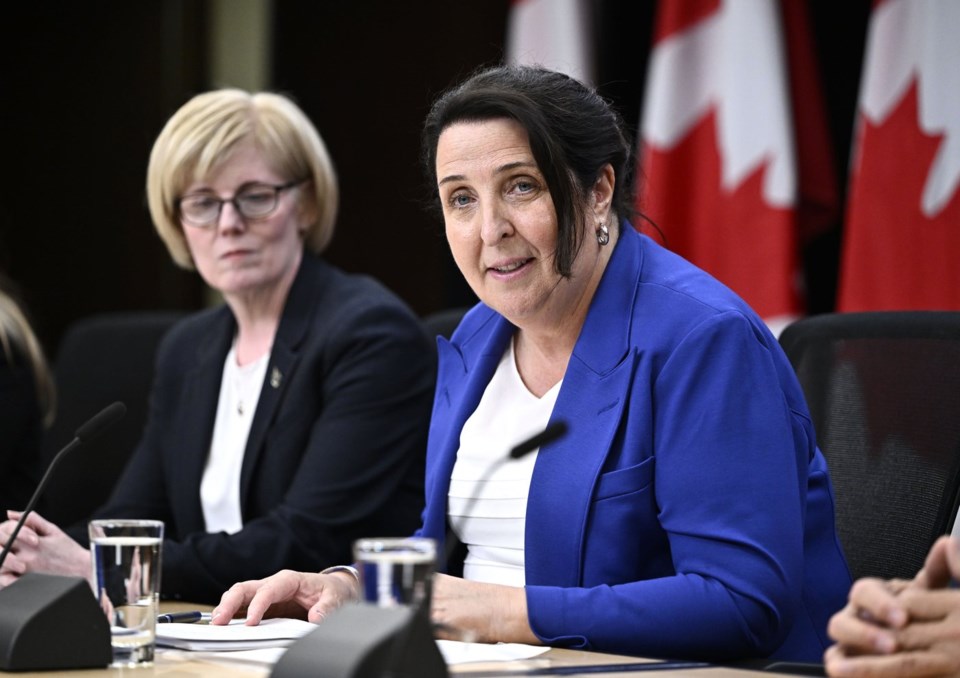The Future of Sport in Canada Commission starts tackling the country's safe-sport crisis later this month with the first of nine hearings.
Federal sports minister Carla Qualtrough announced in late 2023 that the commission's mandate will be to learn from Canadians, including victims and survivors of abuse and maltreatment, about their experience in and with sports.
The commission's first stop Oct. 31 to Nov. 1 is in Toronto and the last is Dec. 10-13 in Halifax.
Other hearing locations are: Regina, Nov. 12-15; Quebec City, Nov. 18-19; Montreal, Nov. 20-22; Winnipeg, Nov. 25-26; Calgary, Nov. 27-29; Victoria, Dec. 2-3; Vancouver, Dec. 4-6.
Qualtrough stopped short of a public inquiry despite calls to do so from several quarters, including former sports minister Kirsty Duncan and the parliamentary standing committee on the status of women.
Bloc-Québécois MP Sebastien Lemire continued to urge for a public inquiry Thursday in the House of Commons.
"This voluntary commission is no more than an advisory body," he said. "It has no real powers to bring about significant change."
Olympic kayak champion Adam van Koeverden, who is now an MP and the parliamentary secretary to the sports minister, countered that a public inquiry would take too long to institute.
"Given that sport is a shared jurisdiction between municipal and regional, territorial, provincial governments and jurisdictions, a public inquiry would have required months of negotiating with provinces," he said. "With the commission, the work is already underway."
The commission is led by Lise Maisonneuve, who is a former chief justice of the Ontario Court of Justice.
"As sport permeates most of our lives, the Future of Sport in Canada Commission looks forward to engaging directly with Canadians across the country, including at the grassroot level, to gather more insights and perspectives regarding their experience in and with sport,” Maisonneuve said Thursday in a statement.
Canada's high-performance sport system has undergone a reckoning since athletes exited Beijing's Winter Olympics in 2022.
Athletes spoke to parliamentary committees of current and historical instances of abuse — mental, verbal, physical and sexual — and fear of retribution for reporting it.
Members of Parliament heard athlete welfare took a back seat to the pursuit of medals.
Hockey Canada became a lightning rod for what Qualtrough and her predecessor Pascale St-Onge called a safe sport crisis in the country after allegations of sexual assault by members of the national junior men's hockey team at a 2018 gala.
Those allegations have not been proven in court. Five players, who all went on to play in the NHL, go before a jury trial next year.
Revelations that Hockey Canada had reached a settlement with the complainant and that the organization used a portion of registration fees to pay out such settlements, amplified calls for sport culture change.
The commission will operate for 18 months, produce two reports and will hold a national summit.
Qualtrough has compared the sport commission's work to that of the Truth and Reconciliation Commission, which between 2007 and 2015 investigated harm caused by residential schools, and proposed both solutions to that harm and prevention of further abuse of Indigenous Peoples.
Athletes Empowered, formerly Gymnasts For Change, lobbied for a public inquiry.
Managing director Amelia Cline hopes the commission will conclude one is needed, but in the meantime, she says she's already met with Maisonneuve.
"We are very eager to see this commission not just produce a report that sits on the shelf, that it actually needs to have meaningful recommendations," Cline said.
The commission won't have the power to compel people to speak to Maisonneuve, she said.
"There needs to be a safe space for survivors to share their stories, but there also needs to be a forum in which the sport organizations that have allowed this crisis to continue are actually held accountable, and their feet are held to the fire, which seems to be lacking in this commission process," Cline said.
"From our perspective, the commission is what we have right now, and we will support our survivor community to engage with it if they wish to, but our concern is that it's still not going to have the teeth that it needs to."
The commission has a public online submission portal for athletes, parents, coaches, officials, administrators, academics, subject-matter experts and sports-related organizations who want to participate.
There are options to take a survey, write to the commission and speak to the commission.
Hearings will be held in-camera "to provide a safe forum for participants to freely share their experiences and opinions" and "allow participants to meet with the commission without certain information being recorded in any form."
This report by The Canadian Press was first published Oct. 24, 2024.
Donna Spencer, The Canadian Press
